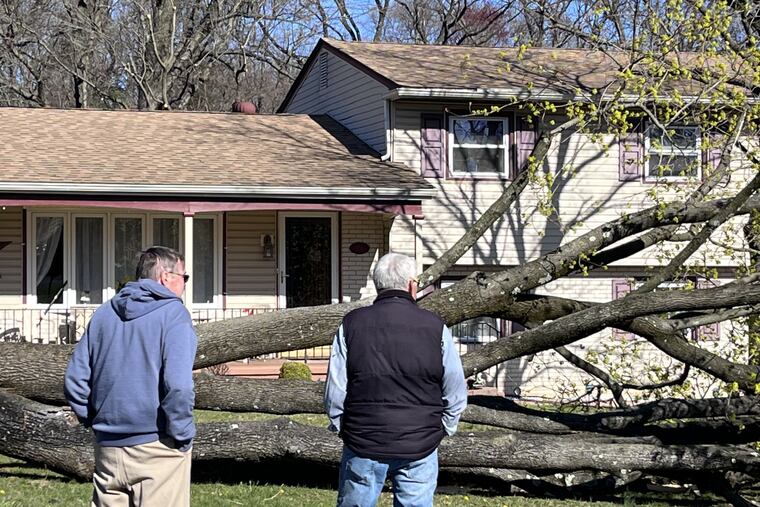What to do when a tornado hits
Basements are best but the last place you want to be is in a car.

We got a dose of Tornado Alley in the Mid-Atlantic this weekend, as eight tornadoes with winds over 100 mph touched down in Burlington County, Central Jersey, Wrightstown in Bucks County, and Bridgeville in Delaware.
The first twisters were confirmed in Cinnaminson, Sea Girt, Jackson, and Howell in New Jersey, along with the ones in Bucks and Delaware. Then the National Weather Service added two more tornadoes to the list Monday night: one in Crosswicks, Burlington County, and another from Allentown to Cream Ridge in Monmouth County. Two more possible Jersey tornadoes are being investigated.
Property was damaged, thousands of people lost power, and many trees were felled in one of the largest regional tornado events since seven twisters cut a path of destruction through New Jersey on Nov. 16, 1989.
And it may not be the last for this year. Spring is early for tornadoes in this part of the country, according to the National Weather Service. Summer is more common.
On that note, here are useful tips for you and your loved ones in case you are caught in a tornado, plus some expert advice on how to safeguard your property with insurance.
What to do when a tornado strikes
According to the National Oceanic and Atmospheric Administration (NOAA), here’s what you need to know if …
… You’re in a house with a basement: Get down there and stay away from windows. Get under some sturdy protection like a heavy table or a workbench or cover yourself with a mattress or blanket. If you know where there are heavy objects on the floor above like a piano or refrigerators, don’t go under them. They could crash through a weakened floor. Head protection like a helmet is a good idea.
… You’re in a house with no basement or an apartment: Avoid all windows. Go to the lowest floor, a small center room like a bathroom or closet, under a stairwell, or an interior hallway with no windows. Crouch as low to the floor as possible, facing down, and cover your head with your hands. Even in an interior room, covering yourself with padding like a mattress or blankets for protection from falling debris is wise. So is a helmet.
… You’re not at home: If you are in a mall or large store, move quickly to an interior restroom, storage area, or other small, enclosed area away from windows. In an office building or hospital, go directly to an enclosed, windowless area in the center of the building away from glass on the lowest floor possible. Then crouch down and cover your head. Interior stairwells can be good shelter. Stay off elevators. In a theater or church, move to an interior bathroom or hallway away from windows. Crouch face down and protect your head with your arms. If there’s no time, get under the seat or pews and protect your head with your arms or hands.
You do NOT want to be in a car or truck: Being in a vehicle during a tornado is dangerous. If the twister is visible but far away and traffic is light, you may be able to drive out of its path by moving at right angles to the storm. Seek shelter in a sturdy building or underground if possible. If you’re stuck in high winds and flying debris, park your car as safely as possible and out of traffic lanes. Stay in the car with your seat belt on and your head below the window. Put a blanket or coat over your head or at least your hands. Do not seek shelter under a bridge.
What to know about tornado insurance policies
A standard homeowner’s insurance policy will cover many kinds of damage caused by a tornado, according to Gregory Kramer, owner of an Allstate Insurance Agency in Newtown, who had quite a few customers affected by the weekend storm.
That includes damage to the home caused by falling trees and hail, but not damage caused by flooding, he added. Some policies will also replace personal property damaged outdoors.
Tornado damage to vehicles is only covered if the owner has comprehensive automobile insurance as part of their policy.
If you do suffer damage, don’t wait to report it. And keep good records.
“The important thing is to call your insurance company immediately,” Kramer said. “Take video, take photos of damage, just to support the claim. Most carriers will allow you to make temporary repairs to prevent any further damage. If you’re relocated, you have to hold on to receipts from working with your claims adjuster to get everything completed.”